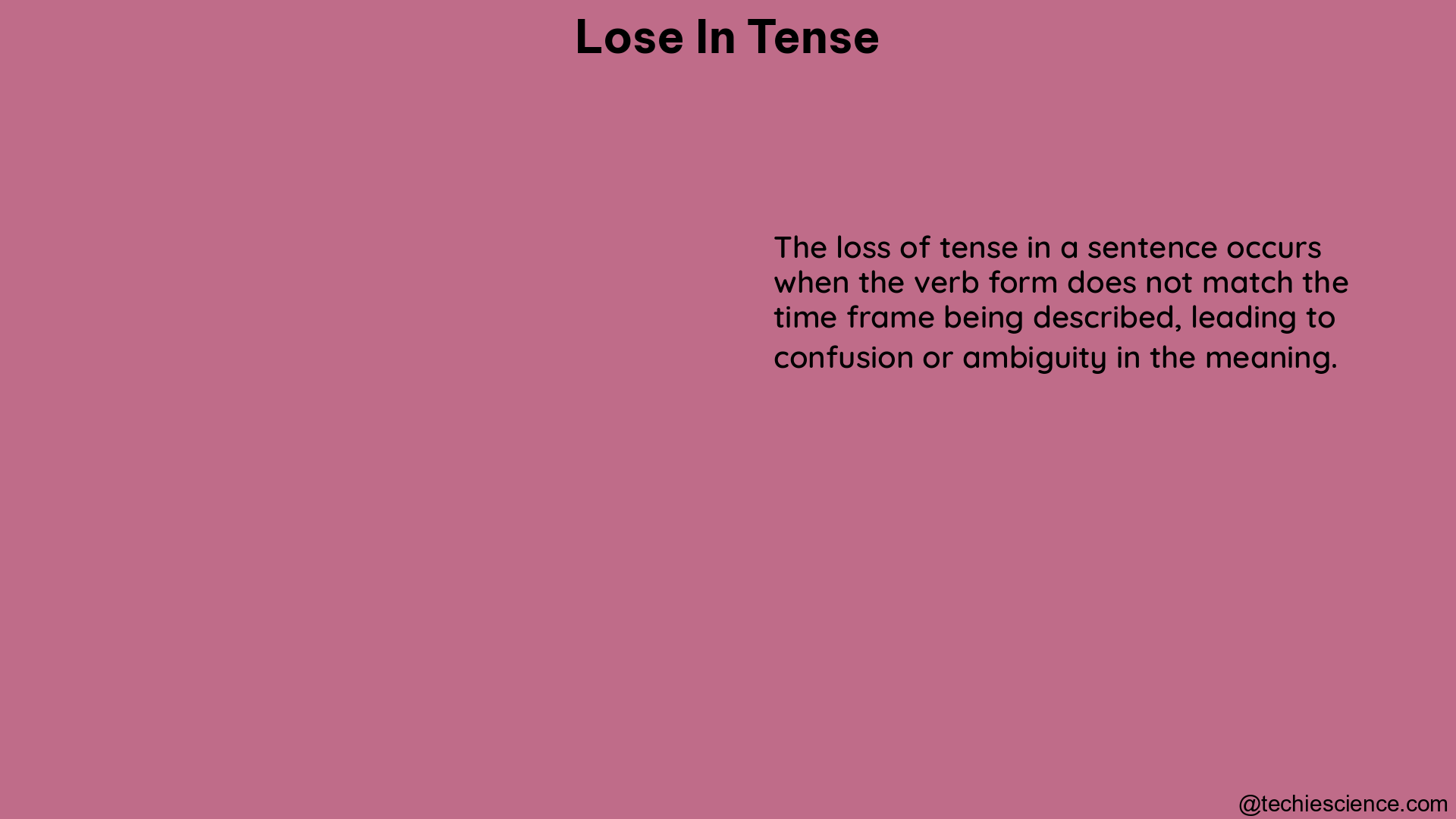The verb “lose” is an irregular verb in the English language, which means its conjugation does not follow the standard pattern of adding “-ed” to form the past tense. Understanding the proper usage of “lose” in different tenses is crucial for effective communication and writing. This comprehensive guide will delve into the intricate details of the verb “lose” across various tenses, providing you with a thorough understanding of its conjugation and usage.
The Present Tense of “Lose”
In the present tense, the verb “lose” is conjugated as follows:
Singular:
– I lose
– You lose
– He/She/It loses
Plural:
– We lose
– You lose
– They lose
Examples:
– “I always lose my keys in the morning.”
– “She loses her temper easily.”
– “We lose track of time when we’re having fun.”
The Present Progressive Tense of “Lose”

The present progressive tense is used to describe an ongoing action in the present. The conjugation of “lose” in the present progressive tense is as follows:
Singular:
– I am losing
– You are losing
– He/She/It is losing
Plural:
– We are losing
– You are losing
– They are losing
Examples:
– “I am losing my patience with this project.”
– “She is losing weight due to her new diet.”
– “They are losing their way in the forest.”
The Past Tense of “Lose”
The past tense of “lose” is an irregular form, and it is conjugated as follows:
Singular:
– I lost
– You lost
– He/She/It lost
Plural:
– We lost
– You lost
– They lost
Examples:
– “I lost my wallet at the park yesterday.”
– “She lost the competition by a narrow margin.”
– “We lost our way and ended up in a different neighborhood.”
The Past Progressive Tense of “Lose”
The past progressive tense is used to describe an ongoing action in the past. The conjugation of “lose” in the past progressive tense is as follows:
Singular:
– I was losing
– You were losing
– He/She/It was losing
Plural:
– We were losing
– You were losing
– They were losing
Examples:
– “I was losing hope that I would ever find my keys.”
– “She was losing her grip on the situation as the chaos unfolded.”
– “They were losing the game until they made a comeback in the final minutes.”
The Present Perfect Tense of “Lose”
The present perfect tense is used to describe an action that has been completed in the past but has relevance in the present. The conjugation of “lose” in the present perfect tense is as follows:
Singular:
– I have lost
– You have lost
– He/She/It has lost
Plural:
– We have lost
– You have lost
– They have lost
Examples:
– “I have lost my appetite after that heavy meal.”
– “She has lost her job due to the company’s downsizing.”
– “We have lost touch with our old friends over the years.”
The Present Perfect Progressive Tense of “Lose”
The present perfect progressive tense is used to describe an ongoing action that began in the past and is still continuing in the present. The conjugation of “lose” in the present perfect progressive tense is as follows:
Singular:
– I have been losing
– You have been losing
– He/She/It has been losing
Plural:
– We have been losing
– You have been losing
– They have been losing
Examples:
– “I have been losing weight since I started my new exercise routine.”
– “She has been losing sleep due to the stress of the upcoming exam.”
– “They have been losing customers to their competitors in the market.”
The Past Perfect Tense of “Lose”
The past perfect tense is used to describe an action that was completed before another past action. The conjugation of “lose” in the past perfect tense is as follows:
Singular:
– I had lost
– You had lost
– He/She/It had lost
Plural:
– We had lost
– You had lost
– They had lost
Examples:
– “I had lost my way before I found the map in my pocket.”
– “She had lost her confidence after the previous failure.”
– “They had lost the game by the time the coach arrived.”
The Past Perfect Progressive Tense of “Lose”
The past perfect progressive tense is used to describe an ongoing action that was in progress before another past action. The conjugation of “lose” in the past perfect progressive tense is as follows:
Singular:
– I had been losing
– You had been losing
– He/She/It had been losing
Plural:
– We had been losing
– You had been losing
– They had been losing
Examples:
– “I had been losing weight for months before the doctor’s appointment.”
– “She had been losing her grip on the situation as the crisis escalated.”
– “They had been losing customers to their competitors for years before they decided to change their business strategy.”
The Future Tense of “Lose”
The future tense is used to describe an action that will occur in the future. The conjugation of “lose” in the future tense is as follows:
Singular:
– I will lose
– You will lose
– He/She/It will lose
Plural:
– We will lose
– You will lose
– They will lose
Examples:
– “I will lose my job if I don’t improve my performance.”
– “She will lose the opportunity if she doesn’t apply for the position soon.”
– “We will lose the game if we don’t score a goal in the next few minutes.”
The Future Progressive Tense of “Lose”
The future progressive tense is used to describe an ongoing action that will be in progress in the future. The conjugation of “lose” in the future progressive tense is as follows:
Singular:
– I will be losing
– You will be losing
– He/She/It will be losing
Plural:
– We will be losing
– You will be losing
– They will be losing
Examples:
– “I will be losing weight as I continue my new exercise routine.”
– “She will be losing her patience with the slow progress of the project.”
– “They will be losing their way in the unfamiliar territory if they don’t have a map.”
The Future Perfect Tense of “Lose”
The future perfect tense is used to describe an action that will be completed before another future action. The conjugation of “lose” in the future perfect tense is as follows:
Singular:
– I will have lost
– You will have lost
– He/She/It will have lost
Plural:
– We will have lost
– You will have lost
– They will have lost
Examples:
– “I will have lost all my savings if I don’t start budgeting properly.”
– “She will have lost the opportunity to study abroad if she doesn’t apply soon.”
– “They will have lost the game by the time the final whistle blows.”
The Future Perfect Progressive Tense of “Lose”
The future perfect progressive tense is used to describe an ongoing action that will be in progress before another future action. The conjugation of “lose” in the future perfect progressive tense is as follows:
Singular:
– I will have been losing
– You will have been losing
– He/She/It will have been losing
Plural:
– We will have been losing
– You will have been losing
– They will have been losing
Examples:
– “I will have been losing weight for a year by the time I reach my goal.”
– “She will have been losing sleep over the project for weeks before the deadline.”
– “They will have been losing customers to their competitors for years before they decide to change their business strategy.”
Conclusion
Mastering the conjugation and usage of the verb “lose” in various tenses is essential for effective communication and writing in English. This comprehensive guide has provided you with a detailed understanding of the different tenses and their corresponding conjugations, as well as numerous examples to reinforce your learning. By applying the knowledge gained from this guide, you can confidently and accurately use the verb “lose” in your everyday language and written expression.
References
- https://www.writingenglish.com/cverbs/lose.htm
- https://conjugator.reverso.net/conjugation-english-verb-lose.html
- https://prowritingaid.com/lose-past-tense

Hi…..I’m a graduate with a Bachelor’s degree in English Literature. I wish to do a Masters in the same field someday and continue my career in Academia.
Let’s connect through LinkedIn: